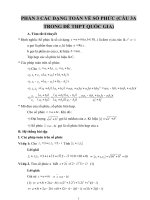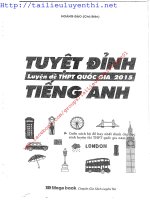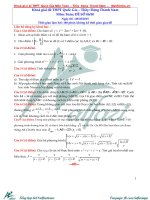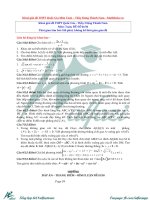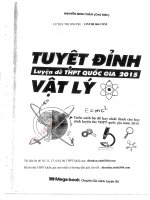- Trang chủ >>
- Y - Dược >>
- Điều dưỡng
DE THPT QUOC GIA 402
Bạn đang xem bản rút gọn của tài liệu. Xem và tải ngay bản đầy đủ của tài liệu tại đây (115.24 KB, 6 trang )
<span class='text_page_counter'>(1)</span>SỞ GD- ĐT VĨNH PHÚC TRƯỜNG THPT LIỄN SƠN ĐỀ CHÍNH THỨC. ĐỀ THI THPT QUỐC GIA NĂM 2015 MÔN THI: TIẾNG ANH Thời gian: 90 phút. PHẦN TRẮC NGHIỆM: (8 điểm) Mark the letter A, B, C, or D on your answer sheet to indicate the word whose underlined part differs from the other three in pronunciation in each of the following questions. Question 1. A works. B. stops. Question 2. A. coughed. B. ploughed. C. washes. D. speaks. C. laughed. D. touched. Mark the letter A, B, C, or D on your answer sheet to indicate the word that differs from the other three in the position of the primary stress in each of the following questions. Question 3. A. open. B. happen. C. offer. Question 4. A. difficulty. B. simplicity. C. discovery. Question 5. A. obligatory. B. geographical. D. begin D. commodity. C. international. D. undergraduate. Mark the letter A, B, C, or D on your answer sheet to indicate the correct answer to each of the following questions. Question 6. _________ he is old, he wants to travel around the world. A. In spite of. B. Although. C. Despite. D. Because. Question 7. Mr. Young is not only healthy .................. also cheerful. A. and. B. both. C. but. D. with. Question 8. He ran …………… fast …………… I couldn’t catch him. A. such/that. B. very/that. C. too/to. D. so/that. Question 9. If I had studied harder, I_________________better in the last exam. A. would do. B. would have done. C. had done. D. wouldn’t have done. Question 10. The larger the apartment, the __________________ the rent is. A. expensive. B. more expensive. C. expensively. D. most expensive. Question 11. Nam wanted to know what time _______. A. the movie began. B. the movie begins. C. does the movie begin D. did the movie begin. Question 12. On attaining maximum size, ---- by drawing itself out and dividing into two daughter amoebas, each receiving identical nuclear materials. A. the reproduction of the amoeba. B. the amoeba, which reproduces. C. reproducing the amoeba. D. the amoeba reproduces. Question 13. For the advertiser, one of the greatest appeals of radio is ---- an audience all day long. A. that it has. B. that to have. C. to have it. D. having it. Question 14. Lenses, ____________,are used to correct imperfections in eyesight. A. are the forms of glasses and contact lenses. B. in the form of glasses and contact lenses. C. glasses and contact lenses which form. D. glasses and contact lenses may be formed. Question 15. Peter: “Thanks a lot for your wonderful gift.” – Mary: “____________” A. You are welcome. B. Thank you. Question 16. Tim: “____________” A. Welcome back! please?. C. Cheers. D. Have a good day. – Jeycy: “Certainly”. B. What are you doing there? C. I’m sorry I am late. D. May I borrow a pencil ,.
<span class='text_page_counter'>(2)</span> Question 17.It was ___ that I bought those books. A. this shop. B. this shop where. C. at this shop. D. the shop. Question 18. He often talks to me about his____________ in the countryside. A. childhood. B. childish. C. childlike. D. childless. Question 19. They explained that she couldn’t take the course, ________? A. could she. B. couldn’t she. C. did she. D. didn’t she. Question 20. Everyone can join our club________age and sex. A. in place of. B. regardless of. C. in case of. D. not mention. Question 21. The total cost to renovate the building was $13 million, ________double the original estimate. A. mostly. B. most all. C. the most. D. almost. Question 22. I saw him hiding something in a ________bag. A. small plastic bag. B. black small plastic. C. small black plastic. D. plastic small black. Question 23. If I were you, I would regard their offer with considerable________, because it seems to good to be true. A. reservation. B. disbelief. C. suspicion. D. doubt. Question 24. I would sooner you________the office phone for personal purpose. A. shouldn’t have used C. not to use. B. shouldn’t use D. didn’t use. Mark the letter A, B, C, or D on your answer sheet to indicate the word(s) SIMILAR in meaning to the underlined word(s) in each of the following questions. Question 25. For calculating a calendar, it is convenient to use the tropical solar year. A. practical. B. critical. C. necessary. D. appropriate. Question 26. The medical community continues to make progress in the fight against cancer. A. speed. B. expect more. C. do better. D. treat better. Question 27. As all of us cannot be available today, let’s put off the discussion till later A. present for the event C. arranged for the event. B. scheduled for the event D. appointed for the event. Question 28. I will not stand for your bad attitude any longer. A. like. B. mean. C. tolerate. D. care. Question 29. Paid employment has undoubtedly brought economic and social gains to many women. A. independently. B. hardly. C. freely. D. certainly. Mark the letter A, B, C, or D on your answer sheet to indicate the underlined part that needs correction in each of the following questions. Question 30. I didn’t feel like to go to church this morning because it was raining hard Question 31. They have been living here since 20 years up to present Question 32. My father asked me where had I gone the night before. Question 33. The science and technology industries have grown up steadily over the last decade Question 34.After he had researched his papers and wrote it, he found some additional data that he should have included.
<span class='text_page_counter'>(3)</span> Read the following passage and mark the letter A, B, C, or D on your answer sheet to indicate the correct word or phrase that best fits each of the numbered blanks. We are using up the world’s petroleum. We use (35)........ in our cars and to heat our building in winter. Farmers use petrochemicals to (36)......... the soil rich. They use them to kill insects (37)......eat plants. These chemicals go (38)......... rivers and lakes and kill the fish there. Thousands of pollutants also go into the air and pollute it. Winds carry this (39).................... air to other countries and other continents. Poor farmers use the same land over and (40)............ The land needs a rest so it will be better next year. However, the farmers must have food this year. Poor people cut down forests (41)......... firewood. In some areas when the trees are gone, the land (42).......... desert. Poor people can’t save the environment for the (43).......... This is not a problem for one country or one area of the world. It is a problem for all- humans. The people and the nations of the world must work together to (44).........................the world’s resources. Question 35. A. it. B. them. Question 36. A. work. B. change. Question 37. A. what. C. that C. make. B. who. D. those D. let. C. whom. D. which. Question 38. A. out. B. for. C. at. D. into. Question 39. A. pollute. B. polluting. C. polluted. D. pollution. Question 40. A. over. B. again. C. repeatedly. Question 41. A. of. B. for. C. with. Question 42. A. gets. B. changes. C. turns. Question 43. A. future. B. time being. C. times. Question 44. A. recycle. B. preserve. C. keep. D. repeating D. at D. becomes D. period D. reuse. Read the passage and choose the best answer among A, B, C, or D. The biologist’s role in society as well as his moral and ethical responsibility in the discovery and development of new ideas has led to reassessment of his social and scientific value systems. A scientist can no longer ignore the consequences of his discoveries; he is as concerned with the possible misuses of his findings as he is with the basic research in which he is involved. This emerging social and political role of the biologist and all other scientists requires a weighing of values that cannot be done with the accuracy or the objectivity of a laboratory balance. As a member of society, it is necessary for a biologist now to redefine his social obligations and his functions, particularly in the realm of making judgments about such ethical problems as man’s control of his environment or manipulation of genes to direct further evolution development. As a result of recent discoveries concerning hereditary mechanisms, genetic engineering, by which human traits are made to order, may soon be a reality. A desirable as it may seem to be, such an accomplishment would entail many value judgments. Who would decide, for example, which trails should be elected for change In cases of genetic deficiencies and disease, the desirability of the change is obvious, but the possibilities for social misuse are so numerous that they may far outweigh the benefits. Probably the greatest biological problem of the future, as it is of the present, will be to find ways to curb environmental pollution without interfering with man’s constant effort to improve the quality of his life. Many scientists believe that underlying the spectre of pollution is the problem of surplus human population. A rise in population necessitates an increase in the operations of modern industry, the waste products of which increase the pollution of air, water and soil. The question of how many people resources of the earth can support is one of critical importance. Although the solutions to these and many other problems are yet to be found, they do indicate the need for biologists to work with social scientists and other members of society in order to determine the requirements necessary for maintaining a healthy and productive planet. For although many of man’s present and future problems may seem to be essentially social , political, or economic in nature, they have biological ramifications that could affect the very existence of life itself..
<span class='text_page_counter'>(4)</span> Question 45: According to the passage, a modern scientist should be more concerned about ……… A. his basic research. B. the development of new ideas. C. his manipulation of genes. D. the consequences of his discoveries. Question 46: The pronoun “it” in paragraph 2 refers to…… A. a reality. B. an accomplishment. C. genetic engineering. D. hereditary mechanism. Question 47: it is implied in the passage that genetic engineering…….. A. may do us more harm than good. B. is no longer desirable. C. is the most desirable in life. D. will change all human traits. Question 48: The pronoun “they” in paragraph 2 refers to…… A. discoveries concerning hereditary mechanisms B. effects of genetic engineering misuse C. cases of genetic deficiencies D. possibilities for genetic deficiencies Question 49: What is probably the most important biological problem mentioned in the passage? A. social and economic deficiencies. B. manipulation of genes. C. genetic engineering misuse. D. environmental problems. Question 50: The word “which” in paragraph 3 refers to…… A. activities of an overpopulated society’s industry B. the waste products into our environment C. activities of surplus human population D. serious environmental pollution Question 51: The word “underlying” in paragraph 3 could be replaced by…… A. noticing. B. causing. C. finding. D. depriving. Question 52: According to the passage, to save our planet, biologist should work A. harder and harder. B. accurately and objectively. C. on social and political purposes. D. with other social scientists. Question 53: Which of the following is closest in meaning to the word “ ramification” in paragraph 4? A. useful experiments. B. effective techniques. C. harmful consequences. D. latest developments. Question 54: What is the author’s purpose in this passage? A. to conduct a survey of the biologist’s role in society B. to urge biologists to solve the problem of surplus human population C. to emphasize the biologist’s role in solving the world’s problems D. to advise biologists to carry out extensive research into genetic engineering Read the passage and choose the best answer among A, B, C, or D. In early civilizations, citizens were educated informally, usually within the family unit. Education meant simply learning to live. As civilizations became more complex, however, education became more formal structured and comprehensive. Initial efforts of the ancient Chinese and Greek societies concentrated solely on the education males. The post- Babylonian Jews and Plato were exceptions to this pattern. Plato was apparently the first significant advocate of the quality of the sexes. Women, in his ideas state, would.
<span class='text_page_counter'>(5)</span> have the same rights and duties and the same educational opportunities as men. This aspect of Platonic philosophy, however, had little or no effect on education for many centuries, and the concept of a liberal education for men only which had been espoused by Aristotle, prevailed. In ancient Rome, the availability of an education was gradually extended to women, but they were taught separately from men. The early Christians and medieval Europeans continued this trend, and singlesex schools for the privileged classes prevailed through the Reformation period. Gradually, however, education for women on a separate but equal basis to that provided for men was becoming a clear responsibility of society. Martin Luther appealed for civil support of schools for all children. At the Council of Trent in the 16th century, the Roman Catholic Church encouraged the establishment of free primary schools for children of all classes. The concept of universal primary education, regardless of sex, had been born, but it was still in the realm of the single-sex school. In the late 19th and early 20th century, co-education became a more widely applied principle of educational philosophy,. In Britain, Germany, and the Soviet union the education of boys and girls in the same classes became an accepted practice. Since World War II, Japan and the Scandinavian countries have also adopted relatively universal; co- educational systems. The greatest negative reaction to co-education has been felt in the teaching, system of the Latin countries, where the sexes have usually been separated at both primary and secondary levels, according to local conditions. A number of studies have indicated that girls seem to perform better overall and in science in particular in single-sex classes: during the adolescent years, pressure to conform to stereotypical female gender roles may disadvantage girls in traditionally male subjects, making them reluctant to volunteer for experimental work while taking part in lessons. In Britain, academic league tables point to high standards achieved in girls’ schools. Some educationalists therefore suggest segregation of the sexes as a good thing, particularly in certain areas, and a number of schools are experimenting with the idea. Question 55: ancient education generally focused efforts on…… A. male learners. B. both sexes. C. female learners. D. young people only. Question 56: education in early times was mostly aimed at……… A. teaching skill. B. learning to live. C. learning new lifestyle. D. imparting survival. Question 57: the first to support the equality of the sexes was……… A. the Chinese. B. the Greek. C. Plato. D. the Jews. Question 58: The word” informally” in this context mostly refers to an education occurring……. A. in classrooms. B. outside the school. C. deprived of opportunities. D. separated from men. Question 59: When education first reached women, they were……… A. locked up in a place with men C. focused on imparting skills. B. isolated from for all the sexes D. was intended to leave out female learners. Question 60: When the concept of universal primary education was introduced, education…… A. was given free to all. B. was intended for all the sexes. C. focused on imparting skills. D. was intended to leave out female learners. Question 61: The word” espouse” is contextually closest in meaning to “….” A. to support. B. to put off. C. to give. D. to induce. Question 62: Co-education was negatively responded to in……. A. Japan. B. the Scandinavian countries.
<span class='text_page_counter'>(6)</span> C. South American countries. D. conservative countries. Question 63: The word “tables” is closest in meaning to “……” A. shapes. B. meeting tables. C. personalities. D. figures. Question 64: The word” segregation” may be understood as”……..” A. grouping. B. mixture. C. separation. D. extraction. PHẦN TỰ LUẬN: (2 điểm) Part I .Finish each of the following the sentences in such a way that it means the same as the sentence given Question 65: “ Please don’t make such a mess in your room,” his mother said. His mother asked…………………………………………………………… Question 66: The Americans have just recalled their ambassador The American …………………………………………………………………….. Question 67: It is not necessary for you to do the test You……………………………………………………………… Question 68: The day was so cold that we stay indoors It was……………………………………………………………… Question 69: She prefers reading to watching TV She would…………………………………………………………………… Part II. In about 140 words, write a paragraph about the importance of family in a person’s life ………………………………………………………………………………………………………………. ………………………………………………………………………………………………………………. ………………………………………………………………………………………………………………. ………………………………………………………………………………………………………………. ………………………………………………………………………………………………………………. ………………………………………………………………………………………………………………. ………………………………………………………………………………………………………………. KEY- TEST 2 1C 2B 3D 4A 5A 6B 7C 8D 9B 10D 11A 12D 13A 14B 15A 16D 17C 18A 19D 20B 21D 22C 23A 24D 25A 26C 27A 28C 29D 30B 31C 32B 33B 34B 35A 36C 37D 38D 39C 40A 41B 42D 43A 44B 45D 46C 47A 48B 49D 50A 51B 52D 53C 54C 55A 56C 57C 58B 59D 60B 61A 62C 63D 64C 65. His mother asked him not to make such a mess in his room 66. The American ambassador has just been recalled 67.You needn’t/ don’t have to/ don’t need to do the test 68. It was such a cold day that we stayed indoors 69. She would rather read a book than watch TV.
<span class='text_page_counter'>(7)</span>


